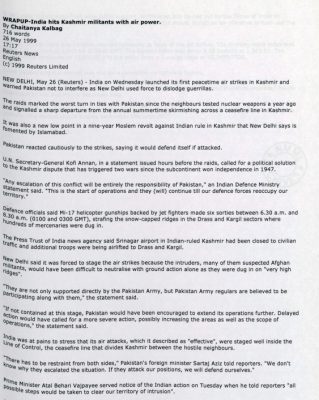WRAPUP-India hits Kashmir militants with air power
[Reuters]
Published date: 26th May 1999
26 May 1999
Reuters News
English
(c) 1999 Reuters Limited
NEW DELHI, May 26 (Reuters) – India on Wednesday launched its first peacetime air strikes in Kashmir and warned Pakistan not to interfere as New Delhi used force to dislodge guerrillas.
The raids marked the worst turn in ties with Pakistan since the neighbours tested nuclear weapons a year ago and signalled a sharp departure from the annual summertime skirmishing across a ceasefire line in Kashmir.
It was also a new low point in a nine-year Moslem revolt against Indian rule in Kashmir that New Delhi says is fomented by Islamabad.
Pakistan reacted cautiously to the strikes, saying it would defend itself if attacked.
U.N. Secretary-General Kofi Annan, in a statement issued hours before the raids, called for a political solution to the Kashmir dispute that has triggered two wars since the subcontinent won independence in 1947.
Any escalation of this conflict will be entirely the responsibility of Pakistan,” an Indian Defence Ministry statement said. “This is the start of operations and they (will) continue till our defence forces reoccupy our territory.”
Defence officials said Mi-17 helicopter gunships backed by jet fighters made six sorties between 6.30 a.m. and 8.30 a.m. (0100 and 0300 GMT), strafing the snow-capped ridges in the Drass and Kargil sectors where hundreds of mercenaries were dug in.
The Press Trust of India news agency said Srinagar airport in Indian-ruled Kashmir had been closed to civilian traffic and additional troops were being airlifted to Drass and Kargil.
New Delhi said it was forced to stage the air strikes because the intruders, many of them suspected Afghan militants, would have been difficult to neutralise with ground action alone as they were dug in on “very high ridges”.
They are not only supported directly by the Pakistan Army, but Pakistan Army regulars are believed to be participating along with them,” the statement said.
If not contained at this stage, Pakistan would have been encouraged to extend its operations further. Delayed action would have called for a more severe action, possibly increasing the areas as well as the scope of operations,” the statement said.
india was at pains to stress that its air attacks, which it described as “effective”, were staged well inside the Line of Control, the ceasefire line that divides Kashmir between the hostile neighbours.
There has to be restraint from both sides,” Pakistan’s foreign minister Sartaj Aziz told reporters. “We don’t know why they escalated the situation. If they attack our positions, we will defend ourselves.”
Prime Minister Atal Behari Vajpayee served notice of the Indian action on Tuesday when he told reporters “all Possible steps would be taken to clear our territory of intrusion”.
senior Indian defence official told Reuters on Tuesday that Afghan mercenaries backed by Pakistani army applies had quietly taken position on several heights overlooking a strategic road connecting Srinagar with Kargil and beyond to the Ladakh region.
defence officials said the last straw was when an Indian reconnaissance plane was shot at and hit two days ago as it flew over the positions held by the militants.
The ministry statement said the shooting occurred despite Pakistan being given prior notice of the survey It was clear India’s action had wide public support. An Internet poll carried out by the Times of India on Tuesday showed that 84 percent of respondents believed India should launch an air offensive to flush out the Intruders.
Markets in both India and Pakistan reacted nervously to news of the air strikes. The Bombay stock index was down 2.86 percent at 3,943.86 at 0840 GMT. The Karachi index was down 3.55 percent at 1,342.51. The Indian rupee weakened to 42.802/812 to the dollar from a Tuesday close of 42.7475/7525.
Some traders said the market was due for a correction on technical factors.
“The concern is obviously whether this might provoke a (Pakistani) retaliation and therefore escalate,” Maulik Sharedalal of Kaji and Maulik Securities said.
But Devesh Kumar, research head at ABN Amro Asia Equities’s India unit, said: “A full fledged war looks very unlikely … the market should bounce back when this cools off.”






